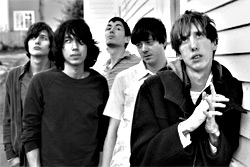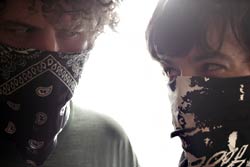It’s not the easiest task in the world to track down Bradford Cox, the lead singer in Deerhunter (also credited with guitar, keyboards, and a myriad of other instruments), as he drives around his hometown of Atlanta. The band—which boasts a critically lauded second album, the mesmeric Cryptograms—landed a dream spot at Pitchfork‘s packed SXSW party, but Deerhunter’s Texas trip turned nightmarish in the end, leading Cox on his own hunt at the moment.
“My entire metal box of doodads and pedals were stolen in Houston on Sunday night!” Cox screams into the phone receiver, his voice fraught, nearly histrionic. He’s spent most of this day seeking in vain his favorite digital delay pedal. The task forced him to go through the torture that is shopping at Guitar Center, only to find that his beloved device is no longer made: “They don’t have what I use anymore! My trademark is gone! My digi-delays, my twin DigiTech delays. It’s a reverse reverb, and there’s no other pedal that has it. I’m fucked!”
While not the main focus of Deerhunter’s sound, Cox’s array of vocal effects does provide a climax and a rupturing of the band’s sustained, reverberated guitar attack against a throttling of bass and drums. Whether or not Cox has his full arsenal with him on tour, there’s little doubt that Deerhunter are one of the more intense live bands in operation. In the blogosphere, the phrase “insane show” gets bandied about like a shuttlecock for the group, yet Deerhunter’s performance at SXSW was a far different beast. Rather than appearing overtly “insane,” the group maintained a palpable seethe, boiling over at crucial junctures with Cox’s looped howls.
So, does such notoriety create unrealistic expectations? “I would rather people have high expectations than low,” Cox demurs, though he understands that “people always show up expecting to see bloodshed or body fluids, like the Black Lips,” Deerhunter’s brother band in Atlanta. The most shocking thing crowds first witness is Cox’s Marfan’s syndrome. It’s a genetic disorder of the connective tissue that leaves its victims with long limbs and, in Cox’s case, gives him the appearance of a true starving artist, a superficiality early critics harped on. The band took it in stride, with its MySpace page running nearly every snarky review of Cox’s physical appearance. Cox believes Deerhunter’s reputation is partially founded on this freak-show allure. “I can just walk onstage and people will be, ‘What the fuck?'” he says in between drags on a cigarette. “If anything, I wouldn’t mind representing something for people, representing sickliness, fucked-up-ness….At least it comes natural to me. And I’m not Marilyn Manson.”
Deerhunter’s musical aesthetic is eerier than any visual appearances, though, with Cryptograms showing a young group hitting its creative stride across two recording sessions. The full-length displays the disembodied, eerie ambience of Animal Collective and Liars, with fleeting though effulgent flashes of the group’s pop sensibilities. Cox explains that Cryptograms was quite personal, detailing a fucked-up adolescence spent in and out of the hospital, during extensive bouts of self-medication and mind-alteration: “I view[ed] high school as this very blurry, pink, warm-fuzzy kind of thing,” he says. Forthcoming is Deerhunter’s new EP, Fluorescent Grey, recorded while the band was in the final mixing stages of its previous disc. Already, the group has grown noticeably, featuring judicious use of piano, an ability to ascend on a single chord, and a greater sense of dynamic hooks.
Cox says that Deerhunter seek to push beyond complacency and critical acceptance, on this EP and beyond: “I’m interested in challenges, musically, narratively,” he says. “I’m not interested in what comes super-easy. If I’m easy and comfortable doing it, I’d rather push it to an extreme.”








